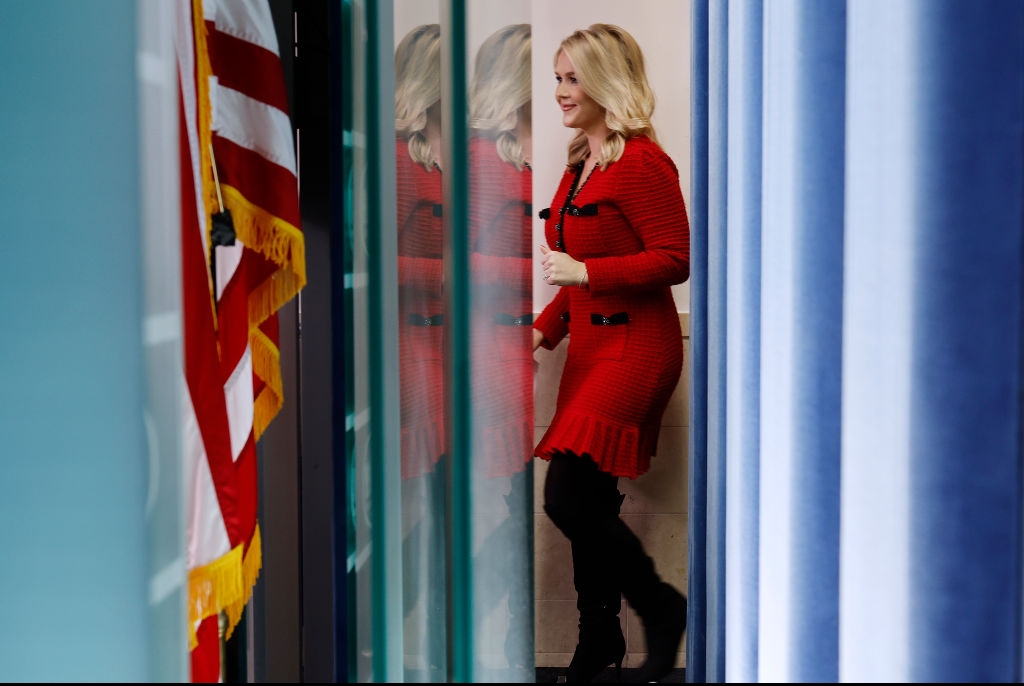White House Press Secretary Karoline Leavitt’s dress has sparked a stir on social media.Leavitt’s dress has sparked a stir on social media. Credit: Chip Somodevilla / Getty
A red and black lace dress worn by the 27-year-old has become the unexpected center of a diplomatic spat between the United States and China as their trade war deepens.
The dress, which was worn in January, resurfaced online this week after Chinese diplomat Zhang Zhisheng, China’s envoy to Indonesia, claimed it was made in China.
In a pointed post on X (formerly Twitter), Zhang mocked the U.S. for criticizing China while allegedly still purchasing Chinese goods.

“Accusing China is business. Buying China is life,” he wrote. “The beautiful lace on the dress was recognized by an employee of a Chinese company as its product.”
Zhang also shared screenshots from the Chinese social media platform Weibo, where users claimed the lace was manufactured in a factory in Mabu, China, and that the dress retails for $750.
Social media users were quick to pile on, some accusing Zhang of sharing a knockoff rather than the original dress.
Others defended Leavitt, prompting Zhang to respond with memes and sarcastic replies. To one X user who wrote that “soon, they will be made in America,” Zhang posted a what appears to be an AI video of obese Americans working in a factory.
When challenged about China’s economic dependence on U.S. investment, he responded: “Read some economy statistics on China before comment.”
The controversy has ignited during a particularly volatile moment in U.S.-China relations.
President Donald Trump’s administration has implemented sweeping tariffs, recently raising import duties on most Chinese goods to 145 percent.
China retaliated with 125 percent tariffs on U.S. products and export restrictions on critical minerals vital to U.S. tech and manufacturing industries.
Leavitt’s dress, identified as a crystal-embellished knit piece by Self-Portrait, was listed for $403 on Farfetch – a 20 percent discount from its original price.

As the fashion item made waves online, TikTok was already flooded with viral videos exposing how many luxury labels rely on Chinese factories for handbags and other goods.
Several posts traced the factory origins of designer items, encouraging consumers to avoid Western retailers and purchase directly from Chinese suppliers.
According to Yahoo, Statista reported China housed 13,820 apparel and accessories manufacturers as of last year.
Fashion law expert Susan Scafidi, founder of the Fashion Law Institute at Fordham University, weighed in on the diplomatic drama, calling the viral interest part of a broader propaganda push.
“After days of Chinese TikTok posts claiming that luxury fashion is actually made in China – exaggerated tales with a few grains of truth – it’s no wonder that a red dress on the White House press secretary is the subject of similarly gleeful propaganda,” Scafidi said.
“Ms. Leavitt’s best response might be to appear at the next briefing with her ensemble inside out, tags on display, if she can find a rare ‘Made in U.S.A.’ label in her wardrobe,” Scafidi added.
Scafidi also voiced skepticism about any near-term relief from the tariff standoff. “I’m not optimistic – either for a speedy reduction in tariffs or for the financial health of American fashion companies and consumers,” she said, adding that budget cuts may allow “the government to pay remaining federal employees enough to cover the costs of clothing that can only be driven higher [in price] by the trade war”.
Minh-ha Pham, a professor of digital media at the Pratt Institute, also weighed in, highlighting how Leavitt’s dress controversy shows economic entanglements, and “underscores a significant blind spot in this administration’s understanding of the global economy and its imposition of tariffs, especially the high tariffs being meted out to Asian countries and China, in particular”.
“Not only are we all connected – for better and for worse – under globalization, but for nearly a century, U.S. trade laws and practices have helped to make China the world’s factory,” she continued. “We shouldn’t be surprised that Leavitt’s dress is [said to be] made in China; no doubt, her phone, and many other things she owns and relies on were also made in China.”
